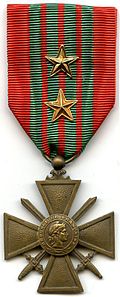National orders
| Legion of Honour | Order of Liberation | National Order of Merit |
|---|---|---|
 |  |  |
This is a list of some of the modern orders, decorations and medals of France. Some, like the Legion of Honour, are awarded to both the armed forces and civilians. Others are decorations of a pure civilian or military character. Only four of the 19 Ministerial orders have survived the reform of the French system of decorations in 1963. The others were replaced by the Ordre national du Mérite.
The Grand Chancery of the Legion of Honour classifies the national system of honours of France into two categories: those honours awarded on behalf of the President of the Republic and ministerial honours. The orders and decorations presented on behalf of the president are the Legion of Honour, Order of Liberation, Military Medal, National Order of Merit, and National Medal of Recognition for victims of terrorism. The ministerial honours include French military decorations, the existing ministerial orders, ministerial awards for acts of courage and honor medals, and commemorative medals. [1]
| Legion of Honour | Order of Liberation | National Order of Merit |
|---|---|---|
 |  |  |
| Order of Academic Palms | Order of Arts and Letters | Order of Agricultural Merit | Order of Maritime Merit |
|---|---|---|---|
 |  |  |  |
| Military Medal | War Cross (1914–1918) | War Cross (1939–1945) | War Cross for foreign operational theaters | Cross for Military Valour | Medal of the Gendarmerie nationale |
|---|---|---|---|---|---|
 |  |  |  |  |  |
| Resistance Medal | Escapees' Medal | Volunteer combatant's cross 1914–1918 | Volunteer combatant's cross | Cross of the resistance volunteer combatant | Combatant's Cross |
|---|---|---|---|---|---|
 |  |  |  |  |  |
| Aeronautical Medal | Overseas Medal | Medal for voluntary military service | National Defence Medal | Medal for the War Wounded | Military Health Service honour medal |
|---|---|---|---|---|---|
 |  |  |  |  |  |
| Honour medal for judicial services | Honour medal for music and chorale societies | Medal of Tourism | Honour medal for road transport | Honour medal for work | Honour medal for public works |
|---|---|---|---|---|---|
 |  |  |  | ||
| First Madagascar campaign medal 1883 | Tonkin Expedition commemorative medal 1883–1885 | Dahomey Expedition commemorative medal 1892 | Second Madagascar campaign medal 1894–1895 | Colonial Medal |
|---|---|---|---|---|
 |  |  |  |  |
| 1901 China expedition commemorative medal | Morocco commemorative medal (1909) |
|---|---|
 |  |
| 1914–1918 Inter-Allied Victory medal | 1914–1918 Commemorative war medal | Dardanelles campaign medal | Orient campaign medal |
|---|---|---|---|
 |  |  |  |
| Medal of French Gratitude | Medal for civilian prisoners, deportees and hostages of the 1914-1918 Great War | Medal for victims of the invasion |
|---|---|---|
 |  |  |
| Syria-Cilicia commemorative medal |
|---|
 |
| 1939–1945 Commemorative war medal | 1943–1944 Italian campaign medal | Medal of a liberated France |
|---|---|---|
 |  |  |
| United Nations Interim Force in Lebanon medal | Medal of the Nation's Gratitude | French commemorative medal | Medal for the Military Protection of the Territory |
|---|---|---|---|
 |  |  |  |
| Order of Tahiti Nui |
|---|
 |
| Order of the Holy Spirit | Order of Saint Michael | Order of Saint Louis | Order of Military Merit |
|---|---|---|---|
 |  |  |  |
| Order of Combatant Merit | Order of Military Merit | Order of Civil Merit | Order of Social Merit | Order of Working Merit |
|---|---|---|---|---|
 |  |  |  |  |
| Order of Touristic Merit | Order of the National Economy | Order of Commercial & Industrial Merit | Order of Artisanal Merit | Order of Public Health |
|---|---|---|---|---|
 |  | |||
| Order of Postal Merit | Order of Sporting Merit |
|---|---|
 |  |
| Indochinese Order of Merit | Saharan Order of Merit | Order of the Black Star | Order of the Star of Anjouan | Order of Nichan el Anouar |
|---|---|---|---|---|
 |  |  |  | |
| Order of the Dragon of Annam | Royal Order of Cambodia |
|---|---|
 |  |
| Departmental and municipal honour medal |
|---|
 |